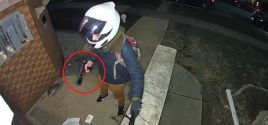End the Pretense that Government Schools and Prisons Are Differentby William GriggNov. 29, 2012 |
Popular 
Ohio Senate Passes Bill Aimed at Outlawing Criticism of Israel, Criminalizing Gospel

Putin Accuses 'Ethnic Jews' of Tearing Russian Orthodox Church Apart

Nick Fuentes Targeted by Gunman at His Home After Being Doxed on Elon Musk's Twitter [UPDATED]

IDF Opens Fire on Syrians Protesting Israel's Expanding Occupation of South Syria

'Saudi National' Rams Car Into Germans at Christmas Market in Suspected Terrorist Attack [UPDATED]
  It's for your own good, kids: The "Isolation Box" at Longview, Washingon's Mint Valley Elementary School. It's for your own good, kids: The "Isolation Box" at Longview, Washingon's Mint Valley Elementary School.Warrantless "drug sweeps" in government-run schools have become routine in recent years. So have "lock-down" drills in which SWAT teams conduct training exercises involving hostage or terrorism scenarios. In some lock-down drills, students inmates have been kept in the dark about the fact that the incident is a training exercise, rather than a genuine crisis. Vista Grande High School in Casa Grande, Arizona, held a lock-down drug sweep on October 31. Students Inmates were confined to their classrooms, then led in small groups to another room where they were forced to line up against a wall and be searched with the help of drug-sniffing dogs. This exercise introduced a new element: Among the four law enforcement agencies involved in the search was a group of prison guards employed by the Corrections Corporation of America, the nation's largest for-profit prison contractor. Notes Caroline Isaacs of the Tucson office of the American Friends Service Committee: "To invite for-profit prison guards to conduct law enforcement actions in a high school is perhaps the most direct expression of the `schools-to-prison pipeline' I've ever seen." Isaacs obviously isn't familiar with Mint Elementary School in Longview, Washington, which has a solitary confinement facility called the "Isolation Box." This is a closet-sized padded cell that is all but indistinguishable from "sweatboxes" used in many prisons. The school hosts a program for disabled students inmates with "behavioral issues" -- an infinitely expandable category that can include any child who is not entirely docile. The school district insists that the Isolation Box is used for therapeutic purposes, and that troubled children can be locked inside only with parental permission. Ana Bate, who posted a photo of the Box on her Facebook page, sensibly commented that the impact of this punitive measure would be anything but therapeutic. "If [school officials] are being paid to lock people up, [they should] get extra education and work in mental health or psychiatric units, not with children that have minds that need to be explored, need to be expanded, that need to feel safe," Bate commented. Clearly, the similarities between government-run schools and prisons are not limited to architecture -- and the differences separating them are increasingly difficult to identify. |



